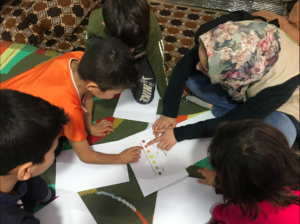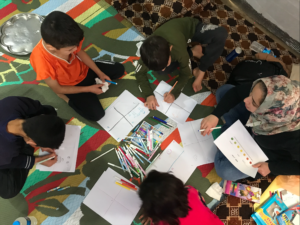SEED Foundation has been providing comprehensive mental health and psychosocial support services since 2015 to those affected by violence and conflict. Many of our cases require more specialized mental health support, as they struggle with trauma symptoms and traumatic stress. Traumatic stress is a mental state in which a person feels extremely anxious and disturbed by symptoms that are caused by very distressing events. These traumatic events are usually characterized by actual or threatened death or injury to self or others, being part  of or witnessing such an event provokes intense fear and helplessness, or a lack of control, which can make the person feel unable to cope. When all these three criteria are met, we speak of traumatic stress. Stress, as most people know it, does usually not include actual or threatened death or injury and thus people feel more able to cope; but the emotional toll from a traumatic event can cause extremely intense, confusing, and frightening emotions.
of or witnessing such an event provokes intense fear and helplessness, or a lack of control, which can make the person feel unable to cope. When all these three criteria are met, we speak of traumatic stress. Stress, as most people know it, does usually not include actual or threatened death or injury and thus people feel more able to cope; but the emotional toll from a traumatic event can cause extremely intense, confusing, and frightening emotions.
Many of our clients in the Kurdistan Region suffer from traumatic stress. Most of them have been through traumatizing and distressing events that have resulted in psychological symptoms that don’t dissolve by themselves after they return to or rebuild their lives. SEED’s psychologists have been providing
 mental health support by using different trauma techniques, such as Trauma-Focused Cognitive Behavioral Therapy and Narrative Exposure Therapy. These approaches require the client to talk about their traumatic histories, whereas late research is showing that this is not always necessary anymore with newer trauma techniques.
mental health support by using different trauma techniques, such as Trauma-Focused Cognitive Behavioral Therapy and Narrative Exposure Therapy. These approaches require the client to talk about their traumatic histories, whereas late research is showing that this is not always necessary anymore with newer trauma techniques.
To better respect the privacy and confidentiality of our clients, and to scale up the number of beneficiaries we are able to help, SEED is implementing a new evidence-based trauma technique called Traumatic Stress Relief (TSR) with individuals and groups. By training SEED’s community mobilizers, case managers, and psychologists in TSR techniques, SEED is increasing the quality of our mental health services and is able to reach more beneficiaries.
TSR is based on the Adaptive Information Model, that shows how stimulating both brain halves through eye-movements or bilateral tapping can help process trauma. Just like we move our eyes when we are in REM -sleep (rapid eye-movement), we move our eyes or activate our senses on two sides of the body to process emotional events and memories. The great benefit of TSR is that our clients do not have to talk about their traumas anymore, which makes it less stressful for them and for our staff. Also, it can be applied in groups, which helps SEED to reach more beneficiaries.
-sleep (rapid eye-movement), we move our eyes or activate our senses on two sides of the body to process emotional events and memories. The great benefit of TSR is that our clients do not have to talk about their traumas anymore, which makes it less stressful for them and for our staff. Also, it can be applied in groups, which helps SEED to reach more beneficiaries.
Since November 2019 SEED’s psychologists have been using TSR with their clients, from the age of 8 years and up, to help them distance trauma memories, increase resilience and lower traumatic stress. SEED has included TSR as part of SEED’s service delivery under a grant from the US Department of State’s Bureau of Population Refugees, and Migration (PRM).

